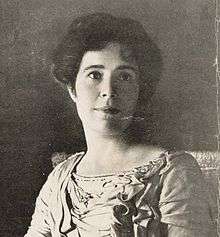Grace Moon
Grace Moon (1884–1947) was an American children's author, publishing many works on Native American themes. Her most notable work was Runaway Papoose, which won a Newbery Honor in 1929.[1]
Grace Moon | |
|---|---|
 | |
| Born | February 5, 1884 |
| Died | 1947 (aged 62–63) |
| Occupation | Writer |
| Nationality | American |
| Genre | Children's literature |
| Notable works | |
Biography
She was born Grace Purdie in Indianapolis. Moon received her education from the University of Wisconsin, National Academy of Design, New York and the Art Institute of Chicago.[2][3] She spent several years in Europe and explored Aztec ruins in Mexico with her father. Her "bringing out" party was at the American Legation in Buenos Aires.[4] In 1911 she married Carl Moon, a painter and photographer of the American Indian.[5] Carl worked at El Tovar Studio in the Grand Canyon from 1911 until they moved to Pasadena in 1914. The couple had two children Francis-Maxwell and Mary.[4] They collaborated on 22 children's books on the Pueblos and Navajos with Carl illustrating some of them.
Selected works
- Indian Legends in Rhyme - 1917
- Lost Indian Magic: A Mystery Story of the Red Man as He Lived Before the White Men Came – 1918
- Wongo and the Wise Old Crow - 1923
- Chi-Wee, The Adventures of a Little Indian Girl – 1925
- Chi-Wee and Loki of the Desert - 1926
- Nadita (Little Nothing) - 1927
- Runaway Papoose – 1928
- The Magic Trail – 1929
- The Missing Katchina - 1930
- The Arrow of Teemay - 1930
- Far-away Desert - 1932
- Book of Nah-Wee - 1932
- Shanty Ann - 1935
- Singing Sands - 1936
- White Indian - 1937, "The story is well-paced and not too far-fetched."[6]
- Solita -1938, "Grace Moon has established a reputation for this type of story, and though there is no particular distinction to this one, it is good routine story-adventure against a Mexican background."[7]
- Daughter of Thunder - 1942, "All Moon books give accurate pictures of Navajo life, showing various customs such as the Rain Dance."[8]
- One Little Indian - 1950
References
- "Newbery Medal and Honor Books, 1922-Present". American Library Association. Retrieved 2015-05-04.
- The Writer, Volume 30, William Henry Hills, Robert Luce, p. 74, 1918
- "Moon, Grace." Junior Book Of Authors (1951): Biography Reference Bank (H.W. Wilson). Web. 2 June 2015.
- Carl Moon family photograph and clipping album, Carl Moon Collection of Family Photographs and Ephemera, Huntington Library
- Best Of The West 2012: Carl Moon, Photographer With A Native Heart Cowboys and Indians, Dana Joseph, June 2012
- "White Indian". www.kirkusreviews.com. Kirkus Media LLC. Retrieved 10 October 2015.
- "Solita". www.kirkusreviews.com. Kirkus Media LLC. Retrieved 10 October 2015.
- "Daughter of Thunder". www.kirkusreviews.com. Kirkus Media LLC. Retrieved 10 October 2015.
Bibliography
- In Search of the Wild Indian: photographs and life works by Carl and Grace Moon, Tom Driebe, Maurose Publishing, 1997
External links
- Works by Grace Moon at Project Gutenberg
- Lost Indian Magic, full text and illustrations
- Indian Legends in Rhyme, full text and illustrations